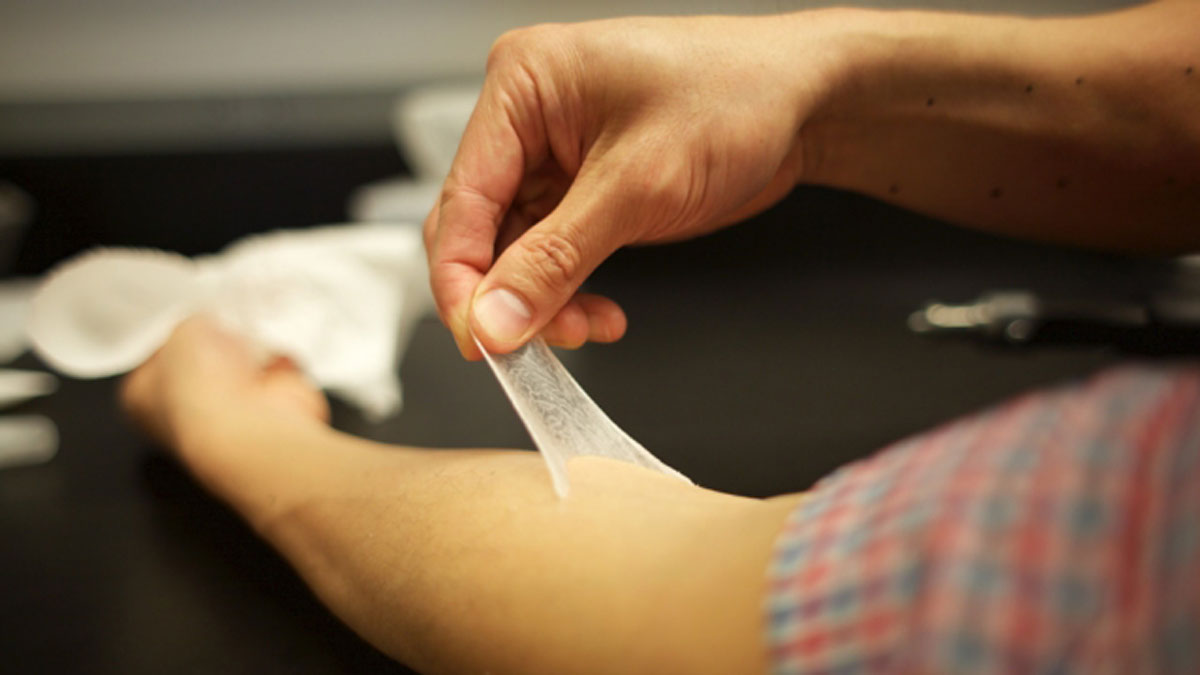XPL: Scientists develop 'second skin' to hide wrinkles
New material 'mimics the properties of youthful skin' with medical and cosmetic benefits

A free daily email with the biggest news stories of the day – and the best features from TheWeek.com
You are now subscribed
Your newsletter sign-up was successful
Scientists have created a clear film they say can remove wrinkles and other blemishes from skin.
The synthetic formula, developed by teams from Harvard and the Massachusetts Institute of Technology, "mimics the properties of youthful skin", reports Nature Materials.
"A wearable material layer that restores the normal skin mechanics and appearance is unprecedented and provides a platform to solve other cutaneous problems," the study authors write.
The Week
Escape your echo chamber. Get the facts behind the news, plus analysis from multiple perspectives.

Sign up for The Week's Free Newsletters
From our morning news briefing to a weekly Good News Newsletter, get the best of The Week delivered directly to your inbox.
From our morning news briefing to a weekly Good News Newsletter, get the best of The Week delivered directly to your inbox.
As well as its cosmetic potential, it could be used to treat a whole host of skin diseases such as eczema and psoriasis, as well as protect against sun damage, they add.[[{"type":"media","view_mode":"content_original","fid":"94673","attributes":{"class":"media-image"}}]]
The LA Times describes the material as flexible, breathable, invisible and water-resistant.
Describing the check-list of challenges behind the development, senior author Robert Langer said: "You want it to be clear, so it's sort of like a transparent second skin. You want it to be mechanically strong, you want it to conform to the skin… and obviously, you want it to be safe."
After a decade of research, the authors believe they have found the perfect material, a silicone-based polymer they call XPL.
A free daily email with the biggest news stories of the day – and the best features from TheWeek.com
XPL is so elastic, it can return to its original shape after being stretched by more than 250 per cent, says the study. In comparison, human skin can only manage 180 per cent, while other synthetic materials are considerably less flexible.
Dr Tamara Griffiths, of the British Association of Dermatologists, told the BBC the development was a "very promising approach to a common problem".
"The results [with the polymer film] appear to be comparable to [cosmetic] surgery, without the associated risks," she added.
The researchers have a spin-off company that could eventually market their patented formula but they say more studies are needed before then. The polymer would also need safety approval from regulators.
-
 The Week contest: AI bellyaching
The Week contest: AI bellyachingPuzzles and Quizzes
-
 Political cartoons for February 18
Political cartoons for February 18Cartoons Wednesday’s political cartoons include the DOW, human replacement, and more
-
 The best music tours to book in 2026
The best music tours to book in 2026The Week Recommends Must-see live shows to catch this year from Lily Allen to Florence + The Machine
-
 Epstein files topple law CEO, roil UK government
Epstein files topple law CEO, roil UK governmentSpeed Read Peter Mandelson, Britain’s former ambassador to the US, is caught up in the scandal
-
 Iran and US prepare to meet after skirmishes
Iran and US prepare to meet after skirmishesSpeed Read The incident comes amid heightened tensions in the Middle East
-
 Israel retrieves final hostage’s body from Gaza
Israel retrieves final hostage’s body from GazaSpeed Read The 24-year-old police officer was killed during the initial Hamas attack
-
 China’s Xi targets top general in growing purge
China’s Xi targets top general in growing purgeSpeed Read Zhang Youxia is being investigated over ‘grave violations’ of the law
-
 Panama and Canada are negotiating over a crucial copper mine
Panama and Canada are negotiating over a crucial copper mineIn the Spotlight Panama is set to make a final decision on the mine this summer
-
 Why Greenland’s natural resources are nearly impossible to mine
Why Greenland’s natural resources are nearly impossible to mineThe Explainer The country’s natural landscape makes the task extremely difficult
-
 Iran cuts internet as protests escalate
Iran cuts internet as protests escalateSpeed Reada Government buildings across the country have been set on fire
-
 US nabs ‘shadow’ tanker claimed by Russia
US nabs ‘shadow’ tanker claimed by RussiaSpeed Read The ship was one of two vessels seized by the US military